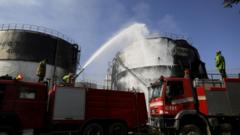The recent cease-fire between Israel and Hezbollah brings relief but also anxiety for displaced residents of northern Israel, who face uncertainty about their communities' future and personal safety as they consider returning home.
Uncertainty Looms for Residents as Israel-Hezbollah Cease-Fire Takes Effect

Uncertainty Looms for Residents as Israel-Hezbollah Cease-Fire Takes Effect
Displaced residents of northern Israel grapple with mixed emotions and safety concerns following the cease-fire agreement with Hezbollah.
In the wake of the recently established cease-fire between Israel and Hezbollah, many thousands of displaced residents in northern Israel are confronting a mixture of relief and uncertainty regarding their future. Reports of the cease-fire sparked excitement for some, including Odie Arbel, a Kibbutz Yiftah resident. At 77, he expressed enthusiasm about returning to his home, famously noted for its view of Mount Hermon and the delicious aromas of grilled meat wafting in the air. However, he shared his apprehensions, stating, "We don’t know what we will be returning to," highlighting fears that those who evacuated might not return.
This sentiment resonates with many families in northern Israel, who have been uprooted and moved from hotels to rental homes or accommodations offered by friends and family for over a year. The cease-fire agreement has raised questions about the social fabric of these communities, as residents ponder whether they should return home or if safety concerns still linger.
Families like that of Orly Gavishi-Sotto are hopeful yet anxious. Living in a rented place with her husband and three daughters, she dreams of returning to Hanita, a hilltop kibbutz with stunning Mediterranean views. Still, she admits worries that a cease-fire may leave Hezbollah empowered enough to pose ongoing threats to Israeli citizens.
As the cease-fire unfolds, the emotional landscape for displaced residents remains complex, with many feeling torn between a desire to reclaim their homes and trepidation about the potential risks associated with such a return. Whether this cease-fire paves the way for long-lasting peace or merely a temporary reprieve remains an open question, one that weighs heavily on the minds of those directly affected.
This sentiment resonates with many families in northern Israel, who have been uprooted and moved from hotels to rental homes or accommodations offered by friends and family for over a year. The cease-fire agreement has raised questions about the social fabric of these communities, as residents ponder whether they should return home or if safety concerns still linger.
Families like that of Orly Gavishi-Sotto are hopeful yet anxious. Living in a rented place with her husband and three daughters, she dreams of returning to Hanita, a hilltop kibbutz with stunning Mediterranean views. Still, she admits worries that a cease-fire may leave Hezbollah empowered enough to pose ongoing threats to Israeli citizens.
As the cease-fire unfolds, the emotional landscape for displaced residents remains complex, with many feeling torn between a desire to reclaim their homes and trepidation about the potential risks associated with such a return. Whether this cease-fire paves the way for long-lasting peace or merely a temporary reprieve remains an open question, one that weighs heavily on the minds of those directly affected.


















